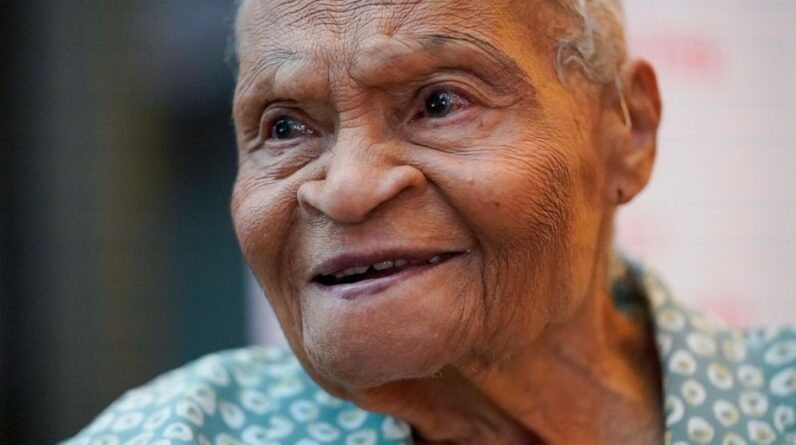
NEW YORK — Being a centenarian hasn’t slowed Viola Ford Fletcher’s quest for justice.
In the past two years, Fletcher has traveled internationally, testified before Congress and supported a demand for reparations, all as part of a campaign for accountability for the massacre that destroyed Tulsa, the original “Black Wall Street.” of Oklahoma in 1921, when she was a child.
Now 109, Fletcher is publishing a memoir about the life he lived in the shadow of the massacre, after a white mob razed the once-thriving black enclave known as Greenwood. The book will be published by Mocha Media Inc. Tuesday and will be available for purchase on August 15.
In a recent interview with The Associated Press, he said fear of reprisals for speaking out had influenced years of near-silence about the massacre.
“Now that I’m an old lady, there’s nothing more to talk about,” Fletcher said. “We decided to make a book about it and maybe that would help.”
Her memoir, Don’t Let Them Bury My Story, is a call to action for readers to seek truth, justice and reconciliation, no matter how long it takes. Written in graphic detail of the 1921 Tulsa Race Massacre she witnessed at the age of seven, Fletcher said she hoped to preserve a narrative of the events that were nearly lost due to a lack of recognition by mainstream historians and political leaders.
“The questions I had then remain to this day,” Fletcher writes in the book. “How can you give a mob of violent, crazy, racist people a bunch of deadly weapons and allow them, nay, encourage them, to go out and kill innocent black people and demolish an entire community?”
“As it turns out, we were the victims of a lie,” he writes.
Tensions between black and white Tulsa residents flared when, on May 31, 1921, the white-owned Tulsa Tribune published a tabloid story about an alleged assault by a 19-year-old black shoe shiner years to a 17-year-old white girl who was working. as an elevator operator.
With the shoe shiner arrested, a black militia gathered at a local jail to prevent a lynch mob from kidnapping and murdering him. A separate violent confrontation between black and white residents then led to all-out war.
For 18 hours, between May 31 and June 1, the expanded mob waged a scorched-earth campaign against Greenwood. The death toll has been estimated at 300. More than 35 city blocks were leveled, an estimated 191 businesses were destroyed, and approximately 10,000 black residents were displaced.
In his memoirs, Fletcher writes about the bumpy ride out of town in a horse-drawn buggy as his family escaped the chaos. He witnessed the execution of a black man, his head exploding like “a watermelon dropped from the roof of a barn.”
The shooter had also fired his shotgun at his family’s stroller.
“We passed piles of corpses piled up in the streets,” he writes in the book. “Some of them had their eyes open, like they were still alive, but they weren’t.”
Descendants of the victims believed that once the conspiracy of silence around them was pierced decades later, justice and reparations for Tulsa’s black community would follow. That hasn’t happened yet: Fletcher and two other centenarian survivors are currently plaintiffs in a lawsuit against the city of Tulsa.
Ike Howard, Fletcher’s grandson and co-author of the memoir, said systemic racism has prevented Tulsa’s black community from fully recovering from the massacre.
“They want to be comprehensive,” Howard said. “We speak for all those who went through a similar situation, who are not here to tell their stories.”
“You can learn a lot from ‘Don’t Let Them Bury My Story’. And we know that history can repeat itself if the problems are not corrected and reconciled,” he added.
Fletcher points out in his memoir how much history he has lived through, from various virus outbreaks before the coronavirus pandemic, to the Great Depression of 1929 and the Great Recession of 2008 to all the wars and international conflicts of the past seven decades . He has seen how Reverend Martin Luther King, Jr. he led the national civil rights movement, has seen the historic election of former President Barack Obama and witnessed the rise of the Black Lives Matter movement.
In 2020, Howard bought his grandmother a new color TV for her birthday. A few months later, on January 6, footage of the mob attack on the US Capitol following the historic election of President Joe Biden and Vice President Kamala Harris retraumatized her.
“With that horrible scene, everything that happened in 1921 in Greenwood flooded back into my mind,” Fletcher writes in the book.
In the AP interview, Fletcher attributed his active lifestyle at an advanced age to his reliance on faith and family. While in New York last month to promote the book with Howard and his younger brother, Hughes Van Ellis, 102, Fletcher saw the cover of his memoir advertised on jumbo screens in Times Square.
Van Ellis, a massacre survivor and World War II veteran whose words from his 2021 congressional testimony serve as the foreword to his sister’s memoir, said he believes justice is possible during his life
“We’re getting very close (to justice), but we’re not close enough,” he said. “We have a lot more work to do. I have to keep fighting. I’m fighting for me and my people.”
___
Aaron Morrison is a member of the AP Race and Ethnicity team. Follow him on Twitter:
[ad_2]
Source link





